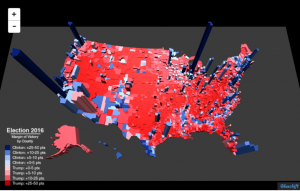Sample Post – A “Representative” Democracy
Though there were many reasons for the fight for independence during the Revolutionary War, one of the messages that continued to echo was the anger felt by the American Colonists at the fact that they were being taxed without proper representation. They disliked the micromanagement ruling style that the British Crown had over a group of colonies a whole ocean away. Thus, they initiate the creation of the United States, where the government was set up to allow people to believe that they did have a voice through people that they were electing. At least only wealthy white men… and then eventually non-wealthy white men… and then African Americans…and then women. It took a long time for everyone within the country to be able to say that they felt like they were being represented, but we seem to be there at this point. As long as you are a citizen age 18 or above and not a convicted felon, a person is allowed to vote. But what happens when there is nobody who truly represents you? Does that still count as a representative vote?
But if so, then who is being represented?
Looking at modern times, namely the 2016 election, you can see that people have become less enamored with politics, but the demographics are changing. According to NPR, millennials have now become a rival force against other generation in the voting population, BUT, it does not seem that we vote nearly as much as Baby Boomers and Gen Xers. It seems to hint at the possibility that younger people who are interested in politics are VERY interested in politics. This is the younger generation, the voters of tomorrow, who will not only have to vote for many more elections to come, but have to deal with the consequences of the outcomes of those elections for much longer. Some may be willing to deal with the consequences, potentially expecting them to happen, while others may be aghast at the thought of certain policy changes. When looking at the political leanings of Millennials, it seems that they are more liberal than their predecessors. For now, they are not the majority of the voting population just yet, but once they are, what will happen to the votes of the older generations?
During the 2016 election, one term that continued to come up over and over again was “blue-collar worker”. Analysts after the election suggested that Donald Trump, and even Bernie Sanders had connected with this population more than Hillary Clinton. Many of the swing states won by Trump were large industrial states, with plenty of disgruntled blue collar workers. At the same time, Hillary Clinton saw massive popularity in major cities, winning almost every metropolitan area in the country, and eventually winning the popular vote. Donald Trump, however, won the electoral vote, and became the president of the United States because he won more districts around the country.
So when comparing the number of people to the distribution of the population, there does seems to be some disconnect, where people in the urban areas seem to forget about the people in the rural “flyover” states, just as well as those in the country forget about the cities. Does this mean that people in the cities should be able to dictate how elections are won, potentially electing candidates who would cause issue for the rural areas, or should those in rural America have a stronger vote than those in the massive population stronghold that are cities?
